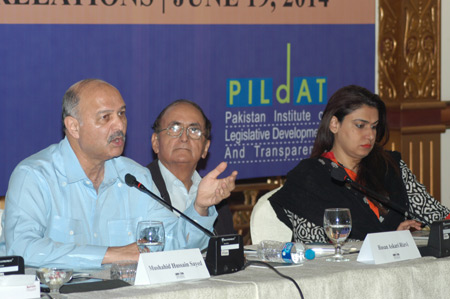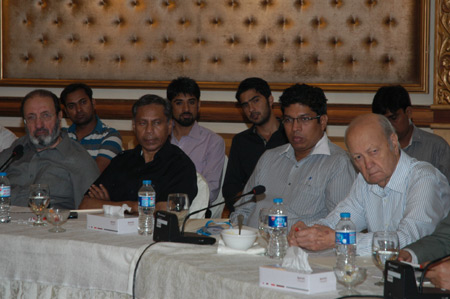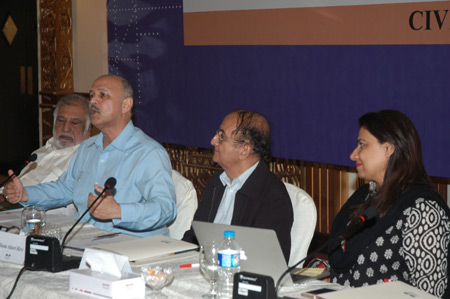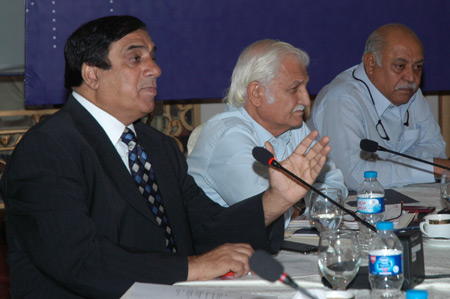|
|
| |
| EVENTS |
|
|
> Institutions Need to be Used for Policy Making and Conflict Management: PILDAT Forum on Democratic and Parliamentary Oversight of Defence in Pakistan
|
| |
|
CMR Forum
June 19, 2014
Islamabad
|
|
| |
June 19; While there have been positive developments in Democratic and Parliamentary oversight on defence and national security in Pakistan, consistent work is required on improving institutional structures. Unless institutions are used for addressing key issues and conflict management, these will become irrelevant. These were the views expressed by Speakers at the PILDAT Public Forum Democratic and Parliamentary Oversight of Defence in Pakistan. |
|
| |
With Senator Mushahid Hussain Sayed, Chairman Senate Standing Committee on Defence, in the Chair, the keynote analysis was presented by Dr. Hasan-Askari Rizvi, Defence and Political Analyst, while leading Senators, MNAs and subject experts joined in the discussion at the Forum.
|
|
| |
Speaking at the Forum, Dr. Hasan-Askari Rizvi said that Pakistan has seen important developments in democratic oversight of defence and national security as the military is more willing to interact with civilians. This is owing to the realisation that issues such as war on terrorism can not be resolved without civilian�s ownership. |
|
| |
Reviewing the performance of Parliamentary Standing Committees on Defence, he said that in the National Assembly, 6 months were wasted in activation of the National Assembly Standing Committee on Defence. The Committee has played a limited role and it needs to be enhanced given that defence is one of the most important sectors and second largest ticket item of the national budget. Dr. Askaribelievedthat civilians need to expand their domain in a consistent and responsible manner. The Senate Defence Committee, in comparison, has continued to expand its domainby enhancing public education through public hearings, Committee�s publications, its international interactions and maintaining a website, etc. The Committee is setting a good example of how to expand space and is leading the way on how civilians can expand their role on defence oversight, said Dr. Askari. |
|
| |
Commenting on the constitution of the National Security Committee (NSC), he said that while it is laudable, the Committee has hardly been used.Unfortunately, for security policy making, informal methods are more important than formal methods in Pakistan such as the informal meetings between the Prime Minister and the Army Chief. Despite the existence of the NSC, meetingsof all the members of NSC are held in the Prime Minister House but without the rubric of NSC. |
|
| |
Dr. Askari also said that the role of Ministry of Defence needs to be reviewed. The Ministry has only had two civilian bureaucrats in the past 14-15 years. Role of Defence Minister is quite irrelevant and Minister is there for only procedural matters. He said that either the country should not have a Defence Minister or have an empowered Defence Minister. |
|
| |
Speaking at the Forum, Senator Mushahid Hussain Sayed, Chairman Senate Standing Committee on Defence said that the Committee has indeed taken important initiatives such as a work plan, publication of reports, maintenance of website and producing media manual on Defence Budget and Cyber Security, etc.The Committee also took the initiative of creating a Defence Reporters Forum. The Committee also initiated Parliamentary Security Dialogue with Afghanistan, China, Saudi Arabia and NATO. The Committee has made important interventions in asking that the National Security should be redefined � it can no longer be based on military might alone but must include Parliament, Political Parties, Economy, Education, Energy and Rule of Law as important elements. Secondly, threats to national security are no longer just India-centric but the new threats are non-Military and non-conventional threats including cyber security, climate change and Anti-Pakistan propaganda. |
|
| |
Earlier,Ms. Aasiya Riaz, Joint Director PILDAT, said that PILDAT has been analysing the performance of defence-related Standing Committees of the Parliament as well as that of the Government over the years under the overall objective of strengthening Democratic and Parliamentary oversight on defence and national security in Pakistan. She said that PILDAT is mindful of the fact that the democratic institutions like the Parliament and Parliamentary committees have not developed over the years due to repeated military intervention and long spells of autocratic or semi-autocratic regimes led by military. The performance reviewes, therefore, are meant to assist the institutions in their oversight functions. The purpose of the analysis is to examine the exercise of available powers of the Democratic Government and the Parliament with regards to Parliamentary oversight of defence and security sector in the light of the Constitution of Pakistan.
The Federal Government should be credited in restructuring the Defence Committee of the Cabinet as National Security Committee with a formal secretariat. Replacing the Defence Committee of the Cabinet (DCC), which had no independent secretariat, staff or support infrastructure, the new Committee was formed by creation of an independent Secretariat and two subsidiaries, the Planning Committee and an Advisory Board. However the NSC can only be effective if it holds regular meetings � at least once a month - on security challenges facing the country. It will be appropriate that the rules of business of the NSC should clearly stipulate the periodicity of its meetings. It is also pertinent to mention here that the UK NSC meets on a weekly basis, chaired by the Prime Minister while the Turkish NSC meets on a bi-monthly basis.
Even though the National Assembly Standing Committee on Defence was activated after 6 months of the formation of the 14th National Assembly, the Committee has progressed a step forward. The Committee reviewed the budgetary proposals and finalised recommendations on Public Sector Development Program (PSDP). They also asked the Inter Services Intelligence (ISI) to brief the Committee members on the security situation of Pakistan, among others. However, comparing to the work of the Senate Standing Committee on Defence, the National Assembly Standing Committee on Defence needs to both engage in greater oversight as well as produce reports and lay those in the House. Since its re-constitution in June 2012, the Senate Standing Committee on Defence has set important trends of putting in place a comprehensive work plan, holding public hearings on Defence issues and publishing reports of the Committee.
She shared that this is the first Parliamentary year in which PILDAT has reviewed the performance of the National Assembly Standing Committee on Interior & Narcotics Control. The major work done by the Standing Committee on Interior during the year was the approval of the Protection of Pakistan (Amendment) Bill 2014 (PPO) by a majority. The Committee must haveinvited experts� opinion on the PPO as well as other pieces of legislation under its review. During the period, Pakistan also unveiled its first ever National Internal Security Policy (NISP). It is unclear whether the National Assembly Standing Committee on Interior reviewed the National Internal Security Policy (NISP) before it was unveiled. However, now that a policy is in place, the critical question is that of the need for a review and oversight mechanism in place for the policy. One of the foremost tasks of the Committee in the future will be the oversight and review of the implementation of the NISP. |
|
| |
PILDAT Reports unveiled at the Forum included:
1. Citizens Report: Performance of the National Security Committee: June 2013-May 2014
[English Version] [Urdu Version]
2. Citizens Report: Performance of the Senate Standing Committee on Defence: June 2013-May 2014
[English Version] [Urdu Version]
3. Citizens Report: Performance of the National Assembly Standing Committee on Defence: June 2013-May 2014
[English Version] [Urdu Version]
4. Citizens Report: Performance of the National Assembly Standing Committee on Interior and Narcotics Control: June 2013-May 2014
[English Version] [Urdu Version] |
|
| |
|
|
| |

|
|
| |
|
|
| |

|
|
| |
|
|
| |

|
|
| |
|
|
| |

|
|
|
|
|
|
|
|
|